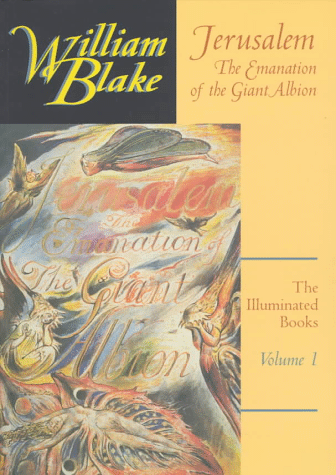 Jerusalem: The Emanation of the Giant Albion by William Blake, 297 pages
Jerusalem: The Emanation of the Giant Albion by William Blake, 297 pagesMadness and genius were never more closely allied than in the person of William Blake, who sought uncompromisingly
To open the Eternal Worlds, to open the Immortal Eyes
Of Man inwards into the Worlds of Thought.
A master engraver as well as a poet, Blake's illuminated books unite both talents in the exposition of his unique inner vision. Indeed, as the introduction to the Blake Trust edition states, "Jerusalem is as epic in its range of graphic techniques as it is in its poetry", and this edition includes full color reproductions of the original's 100 pages, as well as a transcription of the text with notes and commentary, all necessary both to experience the full effect of Blake's work and to even begin to understand the uncanny processions of shadows and spectres and emanations. The center of the epic is the giant Albion, who is simultaneously Adam and England, who, himself sickened, sickens the world.
He hath leagued himself with robbers! he hath studied the arts
Of unbelief! Envy hovers over him! his Friends are his abhorrence!
Those who give their lives for him are despised!
Those who devour his soul, are taken into his bosom!Albion's sons are simultaneously the tribes of Israel and the bishoprics of England, whom Blake portrays as descending into bestial idolatry
Destroying by selfish affections the things that they most admire.
In Blake's mythopoeia art, science, politics, and religion combine in a delirious mixture, full of double meanings and unexpected associations. Nineteenth century England becomes the biblical Babylon:
The Walls of Babylon are the Souls of Men : her Gates the Groans
of Nations : her Towers are the Miseries of once happy Families.
Her Streets are paved with Destruction, her Houses built with Death
Her Palaces with Hell & the Grave ; her Synagogues with Torments
Of ever-hardening Despair squard & polishd with cruel skill
Yet thou wast lovely as the summer cloud upon my hills
When Jerusalem was thy heart's desire in times of youth & love.If Blake condemns much of the modern world, he is scarcely less hostile to tradition, or any worldview which he sees as exalting reason over imagination, or law above grace. Blake's mythic vision defines the cosmos in terms of coupled opposites, the state against the individual, matter against spirit, death against life. And yet he always holds out hope for a reconciliation, or, at least, for conversion.
For the Soldier who fights for Truth, calls his enemy his brother :
They fight & contend for life, & not for eternal death!
No comments:
Post a Comment